Common Good Symposium Showcases a “Little Bit of Everything”
By Tom Porter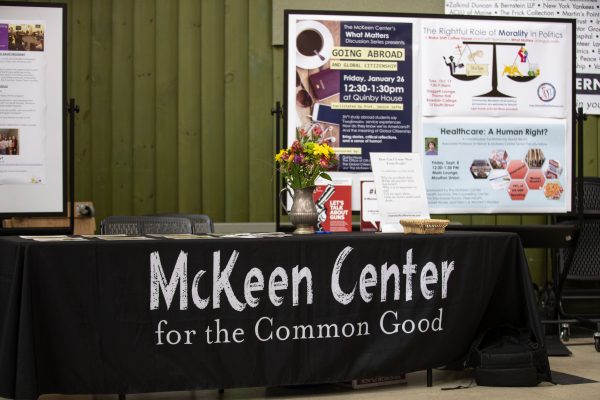

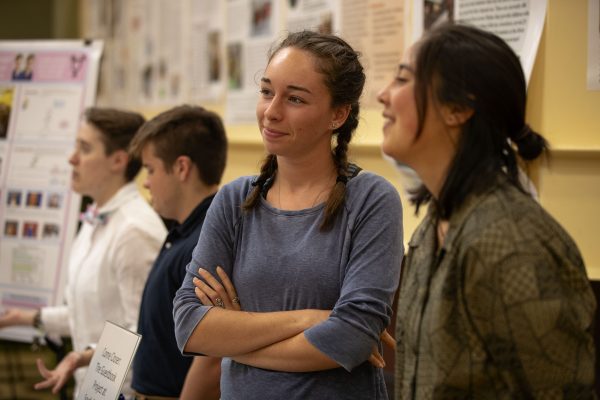
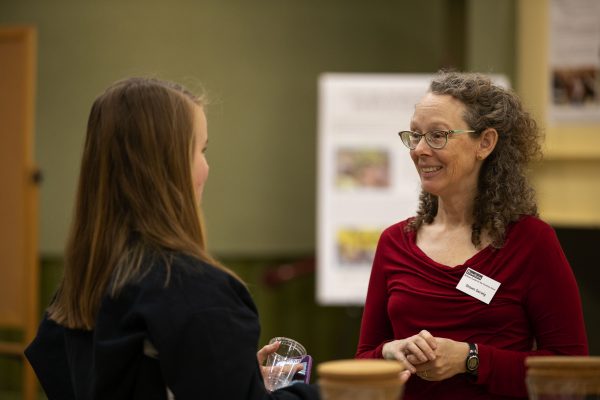

A wealth of projects and programs were showcased at the McKeen Center’s Spring Symposium, Bowdoin and the Common Good, on May 10, 2018. Posters, presentations, photographs, and video were on display in the Morrell Lounge of the Smith Union, representing more than sixty examples of Bowdoin’s commitment to the wider community.
“Some of what we’re highlighting are academic courses,” said Shawn Gerwig, administrative coordinator at the Joseph McKeen Center for the Common Good, which organized the event and sponsored many, but not all, of the projects on display. “There are also representations from offices like dining services and career planning, as well as examples of independent study and honors projects, Alternative Spring Break programs and ongoing volunteer efforts. There’s a little bit of everything from across the campus,” she said, “but it all fits under one theme—the common good.”
The symposium was divided up into four categories: education, sustainability, social justice and public health. Here’s a sampling of what was on offer:
The Kammerling Society – promoting a love of chemistry
With a Pyrex jar in each hand, Julia Morris ’18 was mixing dry ice with water, causing a smoky substance to rise from one of the containers. “One of the cool things about dry ice,” she explained, “is that it goes from solid to gas without being a liquid, hence the steamy appearance.” These are the kind of “cool” experiments she hopes will attract elementary school kids to the study of chemistry.
Morris was representing the Kamerling Society, founded in 1979 and named after Bowdoin chemistry professor Samuel Kamerling (1934-1969). The society is a student group of chemistry majors and other science students who try to get people young and old excited by science. “One of the things we’ve done this semester is going to the local elementary school, Harriet Beecher Stowe, and doing science demos for second-grade classes. They make great junior scientists,” said Morris, “because they ask so many questions!”
Studying Japanese, for third graders
Next to Morris and her experiments is another example of outreach into the local school system, from four Japanese language students. Ethan Barkalow ’18, Graham Bendickson ’20, Isabelle Hallé ’20, and Emma Kellogg ’20 participated in the Foreign Language for Youth, or FLY program, in which they introduced a group of third to fifth graders to the basics of Japanese language and culture.
The kids learned some rudimentary words and phrases, said Kellog, like how to say their name and count to ten. “They also had to come up with a little skit to perform based on what we had taught them. It was really fun and rewarding to see how the kids used this information,” she said.
“It was less about teaching them the language and more about exposing the children to a different culture,” said Bendickson, “and making them aware that not everyone uses the English alphabet.”
‘Passionate about gender’
Lex Horwitz ’19 is passionate about the issue of gender and about educating people. Horwitz, who identifies as a “nonbinary trans guy” uses the “they/them/their” pronoun. At the symposium, Horwitz was showcasing their independent study project, “What’s Gender?” A principal goal for Horwitz is to help people understand the difference between gender identity and gender expression.
“What keeps happening is that someone will look at someone else, look at their gender presentation and assume their gender identity, which can be really detrimental because gender expression doesn’t necessarily say what the gender ID is,” said Horwitz. “If someone appears masculine, it doesn’t necessarily mean they’re male, which is why it’s important to ask people what pronouns they use.” Horwitz said they’re hoping to pursue an honors project next year focusing on transgender youth in elementary school and how to provide education around that subject.
A storytelling video project
Sydney Avitia-Jacques and Claire Brunner, both seniors, have put together an eight-minute documentary for their independent study project with the Digital and Computational Studies program. “It’s a piece of narrative storytelling,” said Brunner, who’s a biology major, “part of a wider initiative called ‘The Guestbook Project,’ which aims to support peacebuilding through the sharing of ideas and stories.”
They interviewed at length four students at South Portland High School, two of them Somalian immigrants, two of them native Mainers. The documentary is about their meeting, how they shared stories and understanding, said Avitia-Jacques. “I’m a sociology major, and something I’ve come to believe is that there’s a lot of power at the individual level, where shared narratives can help people understand each other, so this project was really interesting.” She said the video should be available online once the Guest Project organization has completed its review.
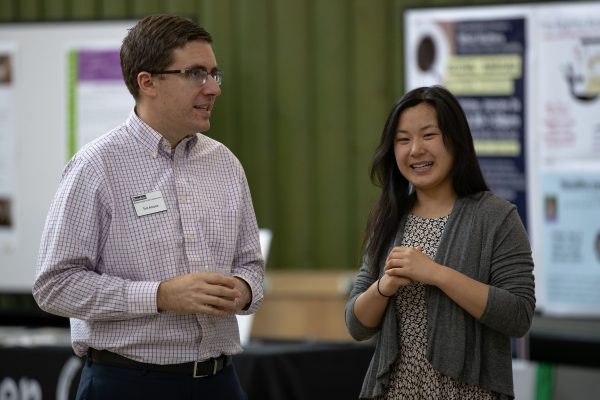
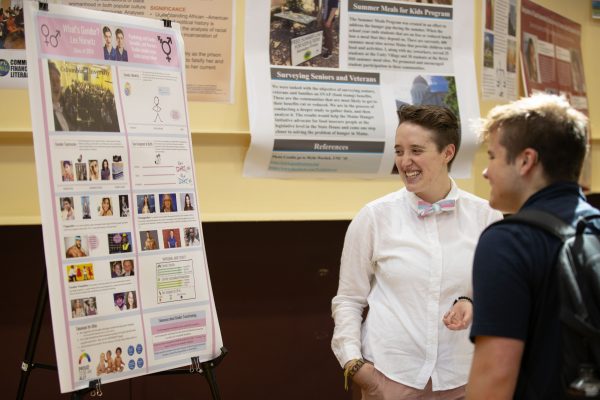

A medical mission to Bangladesh
During the 2018 spring break, Swapnika Mallipeddi ’19 chose not to go on vacation but to spend two-and-a-half weeks in Bangladesh doing public health work. She went at the invitation of the Maine-based medical charity Partners for World Health, with whom she had previously interned. “I went for an independent study project in sociology and public health, with funding from the Department of Sociology and Anthropology as well as the Center for Co-Curricular Opportunities.” Mallipeddi spent her time conducting health surveys with sex workers at a brothel outside the capital city Dhaka. The goal, she said, was to get an accurate picture of these women’s lives—their living and working conditions, how they ended up there, what their health challenges are—with a view to helping them.
“The women ranged from twelve to fifty in age, and some were trafficking victims,” she said. “Conditions were awful: they lived and worked in huts and there was raw sewage in the streets.” She was able to provide some immediate help in the form of medications and educational resources, and the eventual goal, said Mallipeddi, is to develop a daycare for the children of these sex workers. “I’m passionate about global public health and, while this was an emotionally draining experience, it was one of the best I’ve had at Bowdoin.”
Gathering local public health data
Also passionate about public health is Scout Gregerson ’18, although her efforts were closer to home. The project sprang out of a Denning Summer Fellowship she did in 2017 through the McKeen Center to work with the Oasis health center in Brunswick, which provides free healthcare services for low income and uninsured people. “I helped interview community partners and other stake holders, including town managers and people from social service agencies. The aim was to find out what needs are out there, what are the barriers to access are, and how we can help.”
Gregerson, a neuroscience major and sociology minor, took the information she had helped to gather and started drafting a report summarizing all that data and making recommendations. “I was honored to present the findings to the Oasis board of directors, who spent three hours dissecting and discussing the findings.” As a direct result of Gregerson’s efforts, the group has updated its eligibility criteria to help more people, she said. “They’ve increased the income cap and added two more local towns to the eligible areas. It was an awesome experience.”